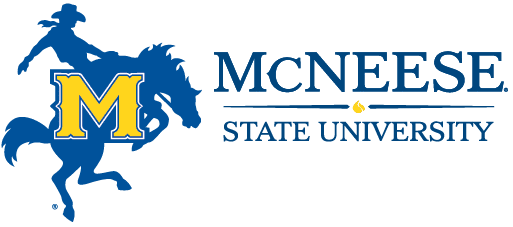Animal Research Compliance
Institutional Animal Care and Use Policies and Procedures
Introduction
It is the policy of McNeese State University to provide the best possible care for animals used in research or teaching, thereby meeting or exceeding accepted guidelines and all applicable federal, state, and local legislation. The University has adopted on an institution-wide basis, the principles regarding animal care as stated in the Animal Welfare Act ![]() and the Guide for the Care and Use of Laboratory Animals
and the Guide for the Care and Use of Laboratory Animals ![]() ; and is guided by the U.S. Government Principles for the Utilization and Care of Vertebrate Animals Use in Testing, Research, and Training
; and is guided by the U.S. Government Principles for the Utilization and Care of Vertebrate Animals Use in Testing, Research, and Training ![]() . All university employees and students are responsible for adherence to this policy. All animals owned and cared for by the university are covered by this policy.
. All university employees and students are responsible for adherence to this policy. All animals owned and cared for by the university are covered by this policy.
Committee Review of Animal Use Protocol Form
All experiments or procedures involving live, vertebrate animals must be approved in advance by the institutional animal care and use committee (IACUC). The Animal Use Protocol form must be submitted through the Office of Research Services. Sufficient time should be allowed for the committee to review the application and, if necessary, to examine the facilities to be used.
All faculty, principal investigators (PI) and students must submit a complete form to the Office of Research Services. This form must be submitted for review by the IACUC a minimum of three weeks prior to initiating the protocol.
In the case of animal use for a class project, individual students (or teams of students, with one acting as the PI) may submit Animal Use Protocol forms marked “Expedited Review – Class Project” on the cover sheet. Students need to include a relevant course number and title. When expedited review is chosen, the response period for members of the IACUC to request a full committee review will be two days from the time that copies of Animal Use Protocol forms are received by all IACUC members. If no full committee review is requested, the review process will default to a designated review. If a full committee review is requested, a meeting will be convened at the earliest possible convenience of members, keeping in mind the time constraints of the semester. Approval is not automatic; class projects are still subject to the same review process as are any research projects involving animals.
To ensure prompt approval, the onus is on the PI to submit full information, ensure that all relevant federal and state regulations are met, and to promptly submit any additional information requested by the IACUC.
Criteria for Review
All proposed activities are reviewed to ensure that the following federal requirements for granting IACUC approval are met:
- Activities
- All activities involving animals must be in accordance with USDA Regulations/ PHS Policy.
- Faculty, PI’s and students who use animals are responsible for adhering to all references, resources and/or guidance related to animal care and use appropriate to their disciplines. References, resources and/or guidance must be documented.
- Pain/Distress
- Activities must avoid and/or minimize discomfort, distress, and/or pain. If pain/distress is caused, appropriate sedation, analgesia, or anesthesia will be used.
- An attending veterinarian must be involved in planning.
- Use of paralytics is prohibited.
- Animals with chronic/severe un-relievable pain will be painlessly killed.
- Criteria and process for timely intervention, removal of animals from a study, or euthanasia must be considered if painful or stressful outcomes are anticipated.
- Alternatives. The PI has considered alternatives to procedures that may cause more than momentary or slight pain or distress to the animal and has provided a written narrative description of the methods and sources used to determine that alternatives were not available.
- Rationale, purpose and methods. All proposals must include:
- Identification of the species and the approximate number of animals to be used;
- A rationale for involving animals and for the appropriateness of the species and numbers of animals to be used;
- A complete description of the proposed use of the animals;
- A description of the procedures designed to assure that discomfort and pain to animals will be limited to that which is non-avoidable for the conduct of scientifically valuable research, including provision for the use of analgesic, anesthetic, and tranquilizing drugs where indicated and appropriate to minimize discomfort and pain to animals; and
- A description of any euthanasia method to be used.
- Duplication Assurance that activities do not unnecessarily duplicate previous efforts must be provided.
- Surgery/Other uses of animals
- Requirements for sterile surgery and pre/post-operative and procedure care must be met.
- A researcher cannot use one animal for several major operative procedures from which it will recover, without meeting specified conditions.
- Euthanasia. The euthanasia/animal disposition method must be consistent with USDA Regulations/AVMA recommendations
 .
. - Housing/Health
- Animal living conditions must be consistent with standards of housing, feeding, and care directed by a veterinarian or scientist with appropriate expertise.
- A qualified veterinarian must provide medical care.
- Safety of the working environment for personnel also must be considered.
- Qualifications. Personnel must be appropriately trained and qualified.
- Deviation from Requirements. Any deviation from established requirements must be justified for scientific reasons, in writing.
Continuing Review and Three-Year Renewal of Ongoing Projects
Animal research protocols are approved for a three-year term, subject to continuing review at least annually.
Continuing Review Process. One month prior to the anniversary date of the last IACUC review, the investigator must complete and return a Continuing Review Summary to the IACUC through the Office of Research Services and Sponsored Programs. The Summary is then reviewed by a committee member. Upon recommendation of the reviewer, the protocol is either approved outright for a period of time up to an additional year or a protocol modification may be requested by the investigator and the normal review process resumes.
Three-Year Renewal. At the end of the third year of a protocol, the investigator must resubmit the proposal for IACUC review to continue research activities. A new Animal Use Protocol form must be submitted; this form undergoes the same review process as any new protocol. The renewal should include all previous modifications or amendments made to the protocol since its original approval.

